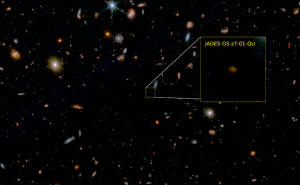Earliest-known 'dead' galaxy spotted by Webb telescope
 Send a link to a friend
Send a link to a friend
 [March 07, 2024]
By Will Dunham [March 07, 2024]
By Will Dunham
WASHINGTON (Reuters) - The James Webb Space Telescope since becoming
operational in 2022 has uncovered numerous surprises about what things
were like in the universe's early stages. We now can add one more -
observations of a galaxy that was already "dead" when the universe was
only 5% of its current age.
Scientists said on Wednesday that Webb has spotted a galaxy where star
formation had already ceased by roughly 13.1 billion years ago, 700
million years after the Big Bang event that gave rise to the universe.
Many dead galaxies have been detected over the years, but this is the
earliest by about 500 million years.
In some ways, this galaxy is like the late Hollywood actor James Dean,
famous for his "live fast, die young" life story.
"The galaxy seemed to have lived fast and intensely, and then stopped
forming stars very rapidly," said astrophysicist Tobias Looser of the
Kavli Institute for Cosmology at the University of Cambridge, lead
author of the study published in the journal Nature.
"In the first few hundred million years of its history, the universe was
violent and active, with plenty of gas around to fuel star formation in
galaxies. That makes this discovery particularly puzzling and
interesting," Looser added.

This galaxy is relatively small, with perhaps 100 million to one billion
stars. That would put it in the neighborhood of the mass of the Small
Magellanic Cloud dwarf galaxy situated near our Milky Way, though that
one is still forming new stars.
After a galaxy stops forming new stars, it becomes a bit like a stellar
graveyard.
"Once star formation ends, existing stars die and are not replaced. This
happens in a hierarchical fashion, by order of stellar weight, because
the most massive stars are the hottest and shine the brightest, and as a
result have the shortest lives," Kavli Institute astrophysicist and
study co-author Francesco D'Eugenio said.
"As the hottest stars die, the galaxy color changes from blue - the
color of hot stars - to yellow to red - the color of the least massive
stars," D'Eugenio added. "Stars about the mass of the sun live about 10
billion years. If this galaxy stopped forming stars at the time we
observed it, there would be no sun-like stars left in it today. However,
stars much less massive than the sun can live for trillions of years, so
they would continue to shine long after star formation stopped."
[to top of second column]
|

A false-color image obtained by the James Webb Space Telescope (JWST)
shows the galaxy JADES-GS-z7-01-QU, the universe?s earliest-known
"dead" galaxy, a galaxy that has stopped star formation, in this
undated handout picture obtained by Reuters. JADES
Collaboration/Handout via REUTERS

The researchers determined that this galaxy experienced a burst of
star formation spanning 30 to 90 million years, then it suddenly
stopped. They are trying to figure out why.
It could be, they said, due to the action of a supermassive black
hole at the galactic center or a phenomenon called "feedback" -
blasts of energy from newly formed stars - that pushed the gas
needed to form new stars out of the galaxy.
"Alternatively, gas can be consumed very quickly by star formation,
without being promptly replenished by fresh gas from the
surroundings of the galaxy, resulting in galaxy starvation," Looser
said.
NASA's Webb is able to look at greater distances, and thus farther
back in time, than its Hubble Space Telescope predecessor. Among
other discoveries, Webb has enabled astronomers to see the
earliest-known galaxies, which have turned out to be larger and more
plentiful than expected.
In the new study, the researchers were able to observe the dead
galaxy at one moment in time. It is possible, they said, that it
later resumed star formation.
"Some galaxies may undergo rejuvenation, if they can find fresh gas
to convert into new stars," D'Eugenio said. "We do not know the
ultimate fate of this galaxy. This may depend on what mechanism
caused star formation to stop."
(Reporting by Will Dunham, Editing by Rosalba O'Brien)
[© 2024 Thomson Reuters. All rights reserved.]This material
may not be published, broadcast, rewritten or redistributed.
Thompson Reuters is solely responsible for this content.
 |